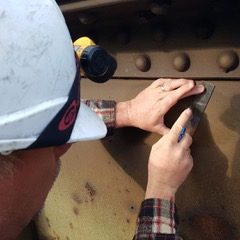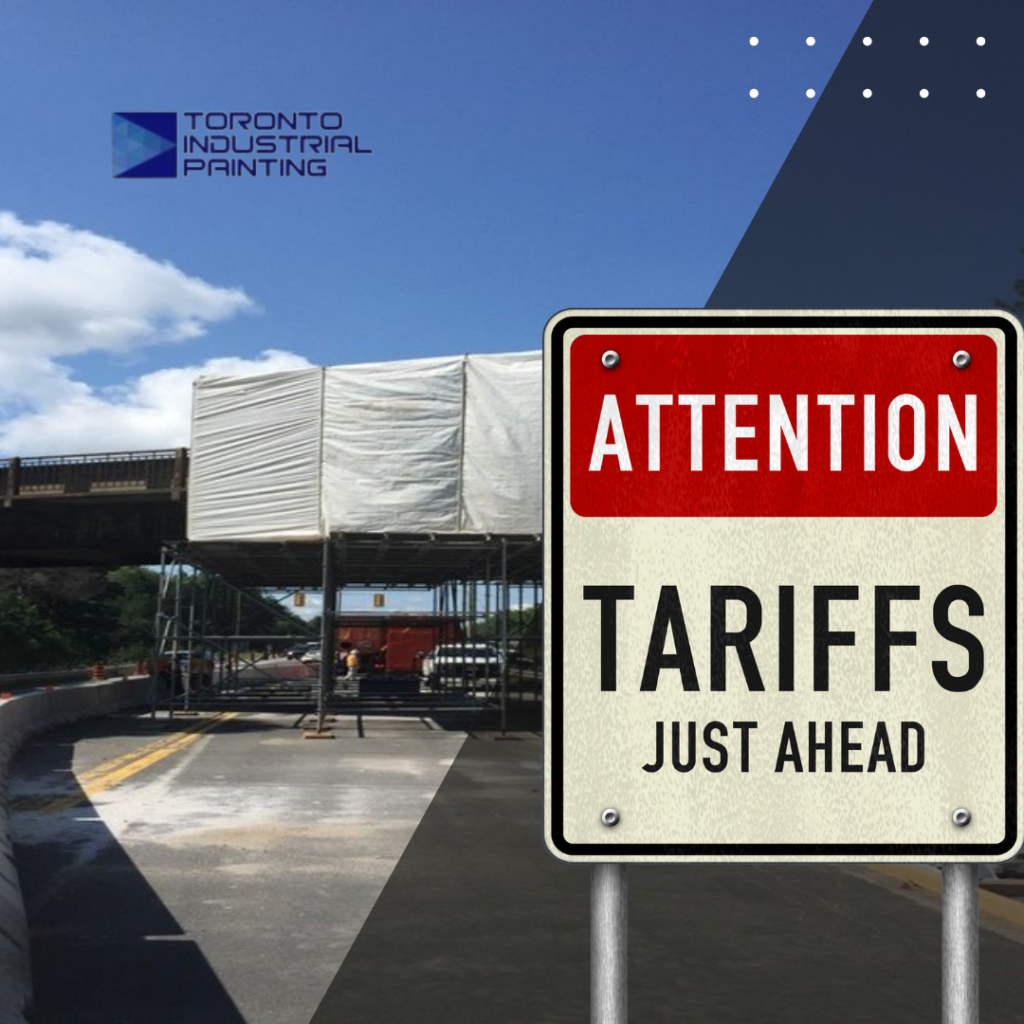
The Trump administration’s recent decision to impose new tariffs on Canadian imports is sending ripples through multiple industries, including the coatings sector. Announced in February 2025, the policy introduces a 25% tariff on Canadian and Mexican imports and a 10% tariff on Chinese imports, affecting everything from raw materials to finished industrial products. While these tariffs aim to bolster American manufacturing and reduce dependence on foreign goods, they come with unintended consequences—especially for industries with deeply integrated North American supply chains.
The coatings industry, which depends on key raw materials like titanium dioxide, resins, solvents, and protective pigments, is particularly vulnerable to these trade disruptions. With Canada being a major supplier and trading partner in the coatings sector, manufacturers, contractors, and inspection companies across both countries are expected to feel the impact. Increased material costs, supply chain delays, and economic uncertainty could drive up the cost of coatings production and, by extension, coatings inspection services.
For companies involved in industrial asset protection—such as Toronto Industrial Painting and its AMPP-certified coating inspectors—these changes present challenges in pricing, logistics, and market competitiveness. To stay ahead, industry leaders will need to navigate this evolving trade landscape strategically, adapting their sourcing, pricing, and operational strategies to mitigate financial strain.
Key Takeaways
- Tariffs on Canadian imports will significantly impact the coatings industry, increasing raw material costs and disrupting supply chains.
- The price of coatings and inspection services is expected to rise as manufacturers and contractors adjust to higher material expenses.
- Canadian coatings manufacturers face reduced exports, job losses, and economic pressures.
- U.S. businesses reliant on Canadian coatings may see increased operational costs, leading to shifts in sourcing strategies.
- Industry adaptation will be crucial, with companies needing to explore alternative suppliers, improve efficiencies, and adjust pricing strategies.
Also see our article on: How Much Does It Cost to Do a Coating Inspection?
Impact on Raw Material Costs
The coatings industry relies heavily on Canadian-sourced raw materials, many of which will now be subject to higher import duties. These include:
- Titanium dioxide (TiO₂): A critical pigment for coatings that ensures durability and brightness.
- Resins and binders: Essential for coating adhesion, many of which are sourced from Canadian petrochemical facilities.
- Solvents: Used in various coatings and thinning agents, imported in large volumes from Canada.
With these materials already experiencing price volatility due to global supply chain disruptions, the tariffs will only add further strain, forcing manufacturers to either absorb the costs, pass them on to customers, or find alternative sourcing options—all of which can negatively impact the industry.
Supply Chain Disruptions and Inspection Challenges
Beyond rising costs, the tariffs also introduce logistical bottlenecks for the coatings sector. Canada and the U.S. share a tightly woven supply chain, with raw materials and finished products frequently crossing borders for processing, formulation, and distribution. The new tariffs could lead to:
- Delays in obtaining critical materials, affecting production schedules.
- Increased compliance and customs paperwork, adding administrative costs.
- Higher inspection fees, as coating inspectors will need to account for material cost surges in their pricing.
For companies specializing in coating inspections, including Toronto Industrial Painting, these disruptions may result in higher costs for businesses requiring inspections—especially in industries like oil & gas, infrastructure, and manufacturing, where protective coatings are vital for safety and compliance.
The Effect on the Canadian Coatings Industry
The Canadian coatings industry is expected to take a direct hit, as U.S. buyers may reconsider purchasing from Canadian suppliers due to the new 25% cost increase. This could lead to:
- Decreased exports, forcing Canadian manufacturers to seek alternative markets.
- Job losses in the coatings and manufacturing sectors.
- More competitive pricing within Canada, pressuring profit margins.
Additionally, the broader Canadian manufacturing sector is already showing signs of economic slowdown due to these tariffs. The S&P Global Canada Manufacturing PMI fell to 47.8 in February 2025, indicating contraction for the first time in six months. If this trend continues, it could stifle investment and innovation within the Canadian coatings sector.
Repercussions for the U.S. Market
While the tariffs are intended to protect U.S. manufacturing, they also create new challenges:
- Increased costs for businesses that rely on Canadian coatings and inspection services.
- Potential shifts in sourcing, leading to reliance on alternative international markets, such as Europe or Asia, which may have longer lead times and higher shipping costs.
- Tighter profit margins for coatings contractors and inspectors who struggle to absorb increased costs without losing clients.
Additionally, uncertainty over trade policies has led to a “wait-and-see” approach from many U.S. manufacturers, slowing down industrial production growth as companies pause investment decisions.
Market Adaptations and Possible Solutions
To navigate these challenges, coatings industry players may explore:
- Alternative Sourcing: Finding new suppliers within the U.S. or countries not subject to tariffs.
- Efficiency Improvements: Reducing waste and improving production processes to counterbalance increased costs.
- Adjusting Pricing Models: Passing some costs onto consumers while remaining competitive.
- Advocacy and Negotiation: Engaging with industry groups and policymakers to discuss tariff exemptions or adjustments.
Conclusion
The new tariffs on Canada present a serious challenge for the coatings industry on both sides of the border. While designed to promote domestic manufacturing, they also introduce significant cost burdens, supply chain disruptions, and economic uncertainties for coatings manufacturers, contractors, and inspectors alike.
Companies in the coatings sector will need to proactively adapt by reassessing supply chains, optimizing operations, and engaging with trade organizations to mitigate the financial impact. Those that successfully navigate these challenges will emerge stronger in a rapidly shifting global market.
Also check out our recent work certifying painters for a U.S. Army Corps of Engineers project.
References
White House Fact Sheet on Imposed Tariffs
Impact of U.S. Tariffs on Chemical and Coatings Industries
Analysis of 25% Tariffs on Canada and Mexico
Canada’s Retaliatory Tariffs Impacting Packaging Industries
Industry Leaders’ Reactions to Tariffs
U.S. Tariffs on Steel and Aluminum Imports from Canada
White & Case Summary of Imposed Tariffs
CNN Analysis of Economic Impact of Tariffs
Canada–United States Trade Relations Overview
Second Presidency of Donald Trump – Tariffs Policy
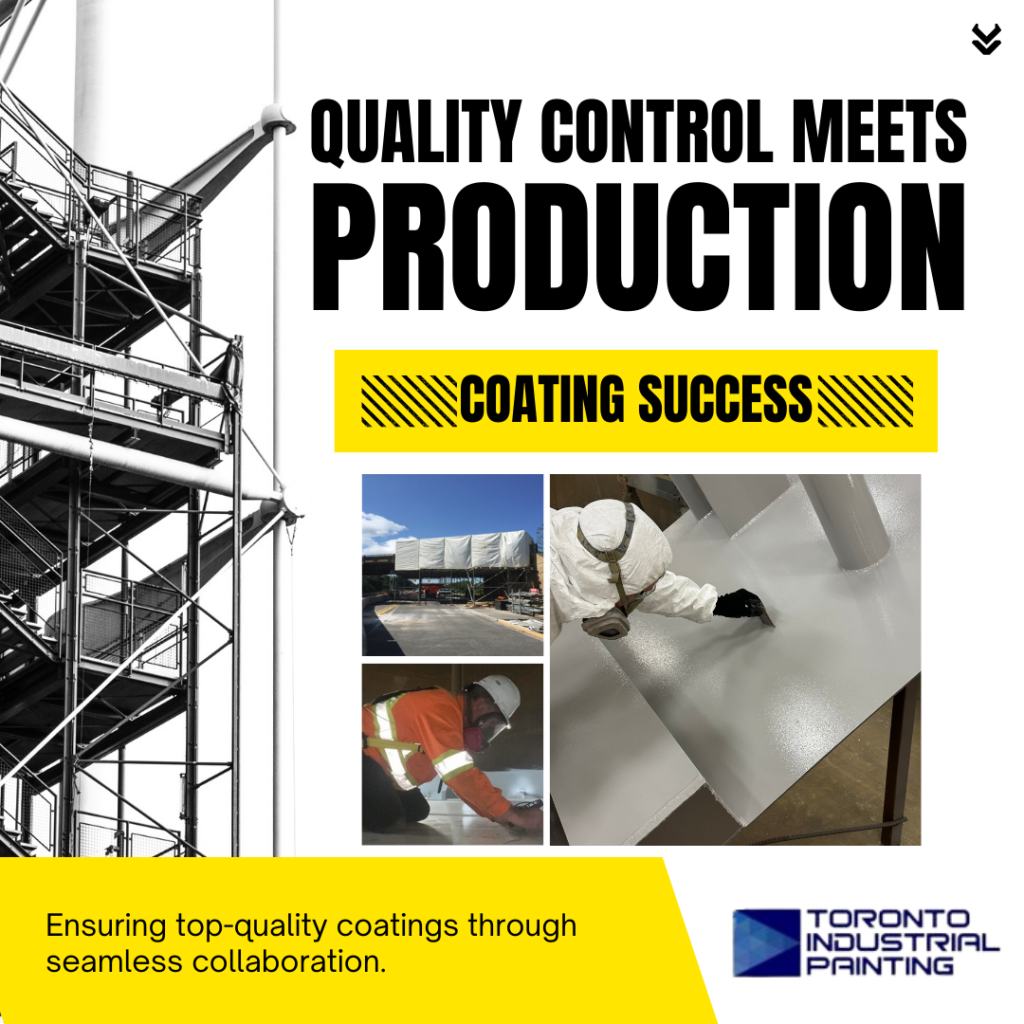
As someone deeply involved in the coating industry, I’ve seen how critical the relationship between Quality Control (QC) and Production is to the success of any project. In my latest article, The Vital Relationship Between Quality Control and Production, I explore why these two teams must work in harmony to deliver durable, consistent, and high-performing coatings.
QC and Production each bring unique strengths to the table. QC focuses on ensuring materials, processes, and results meet stringent standards through careful testing, inspection, and documentation. On the other hand, Production ensures the efficient application of coatings, from surface preparation to curing, while keeping the process running smoothly.
Where they overlap is where the magic happens. By working together, QC and Production can:
- Align on process parameters like coating thickness and curing times to avoid defects from the start.
- Monitor processes in real-time to address any issues early, preventing waste and maintaining consistency.
- Collaborate on root cause analysis when challenges arise, using each team’s expertise to improve the process and the final product.
In my experience, communication and collaboration are the cornerstones of this relationship. Clear expectations, ongoing feedback, and shared problem-solving not only reduce rework and waste but also result in coatings that meet and exceed performance and aesthetic expectations.
At Toronto Industrial Painting, this synergy between QC and Production is a core principle of how we operate. Our coating inspection services across Southern Ontario are designed to ensure your projects achieve the highest standards of quality and efficiency.
Read my full article on LinkedIn to learn more about how these teams can work together to transform your next coating project.
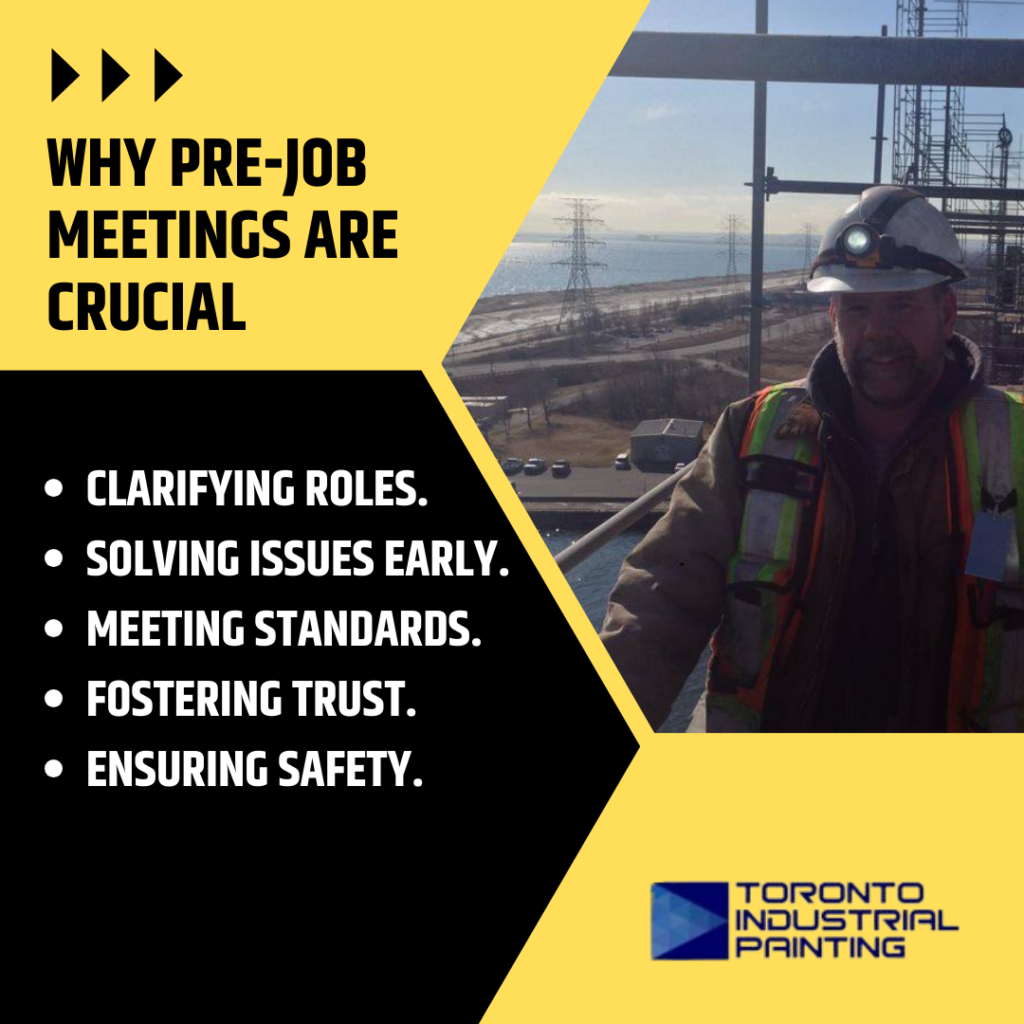
When it comes to successful project execution in the coating industry, preparation is everything. One often-overlooked but absolutely critical step in this process is the pre-job meeting. Having worked in this industry for years, I’ve seen countless projects benefit from this vital step—and, unfortunately, a few that suffered without it.
Pre-job meetings set the stage for alignment, collaboration, and efficiency between contractors and inspectors. They provide a chance to address key details like the project’s scope, regulatory requirements, and safety protocols—all before the first coat of paint is applied. These meetings aren’t just about ticking boxes; they’re about creating a roadmap for success that minimizes misunderstandings and costly delays.
In my latest article, I delve into the core reasons why pre-job meetings are indispensable:
- They ensure that all parties are on the same page regarding expectations, from the scope of work to the standards being inspected.
- They uncover potential challenges early, such as site access issues or material concerns, allowing teams to find proactive solutions.
- They establish clear lines of communication and trust, fostering a collaborative environment where problems can be addressed efficiently.
But the benefits don’t stop there. Pre-job meetings also streamline documentation requirements, align inspection schedules, and prioritize compliance with safety protocols and industry standards. These discussions are the glue that holds a project together, ensuring that contractors and inspectors work toward a common goal.
Read the full article here to dive deeper into these insights and see how a simple pre-job meeting can transform the success of your next project.
At Toronto Industrial Painting, we bring this same level of attention to detail to our coating inspection services across Southern Ontario. From start to finish, we’re committed to ensuring your projects are executed with precision and care. Contact us today to learn how we can support your next venture.
In industrial asset management, ensuring the integrity and performance of coatings is paramount. These protective layers serve as the first line of defense against a variety of environmental and operational threats that can compromise the longevity and functionality of critical infrastructure. Toronto Industrial stands at the forefront of this essential service, offering unparalleled expertise in coating inspection across diverse industries. By prioritizing asset integrity maintenance through rigorous inspection practices, we safeguard our clients’ investments and contribute to the sustainability of valuable industrial assets.
On this page
Understanding Coating Inspection
Coating inspection is a comprehensive process designed to evaluate the effectiveness and longevity of protective coatings applied to industrial equipment, structures, and facilities. This meticulous examination plays a crucial role in preventing premature failures, extending asset life, and ensuring safety and regulatory compliance. Key aspects of a coating inspection include visual assessment, thickness measurement, adhesion testing, and monitoring of environmental conditions during application and curing phases. Through these inspections, potential issues such as corrosion, blistering, and inadequate coverage can be identified and addressed before resulting in significant damage or operational disruptions.
Factors Influencing Inspection Cost
The cost of conducting a coating inspection is influenced by several critical factors. The level of certification of the inspectors, as delineated by the AMPP (Association for Materials Protection and Performance), significantly impacts the inspection’s depth and reliability. Inspectors are classified into Levels 1, 2, and 3, with each level denoting a higher degree of expertise and capability. Furthermore, the complexity of the project and the scope of the inspection required to thoroughly assess the coating’s condition can vary dramatically, affecting the overall cost. Additionally, logistical challenges and the specific location of the project can also play a significant role in determining the inspection expense.
See also How Trump’s New Tariffs on Canada Impact the Coatings Industry
Market Challenges:
In recent times, the coating industry has observed a concerning trend: the rise of third-party coating inspectors and freelancers offering inspection services at significantly reduced rates. This development, while financially attractive at first glance, introduces a myriad of challenges for the market. Vijesh Vijayan, a notable voice in the industry, has articulated the ramifications of this trend: “The presence of low-cost coating inspectors with NACE/FROSIO Level 2, 3 certification poses a significant threat to the market. Offering services at incredibly low rates often compels clients to prioritize cost over quality. This not only devalues our expertise but also undermines the trust and confidence clients place in us”.
This shift towards cost-centric choices can endanger the structural integrity and safety of industrial assets by sidelining the quality and depth of the inspection process. It places experienced professionals in a tight spot, struggling to secure engagements or to maintain a competitive pricing structure without compromising on quality.
Moreover, Vijayan’s insights shed light on the broader implications of such practices: compromising work quality and devaluing proper certification. Certified inspectors, especially those with NACE or FROSIO Level 2 and 3 credentials, have completed extensive training and possess the field experience necessary to identify and address potential issues effectively. Their fees reflect the depth of their expertise and the critical role they play in ensuring project quality and asset longevity.
Emphasizing Quality and Expertise:
In this challenging landscape, it’s imperative for clients and service providers alike to prioritize the long-term benefits of quality inspections conducted by certified professionals. Doing so not only safeguards the structural integrity of assets but also promotes a market environment that values expertise, ethical practices, and the maintenance of high industry standards.
Acknowledging these market dynamics allows us to navigate these challenges with a greater emphasis on quality, expertise, and the ethical provision of services. It underscores the importance of making informed decisions that support the sustainability and safety of industrial assets over mere cost-saving measures.
Toronto Industrial Painting’s Inspection Services
Toronto Industrial offers a comprehensive array of coating inspection services tailored to meet the needs of different industries. With a team of AMPP-certified inspectors, they possess the proficiency to identify a wide range of issues, from corrosion under insulation to damaged paint systems. “Our inspection services are not limited to post-application assessments but also encompass pre-application consultations to ensure the selection of appropriate coating systems and application methodologies. This proactive approach enables the identification and rectification of potential issues before they evolve into costly problems.”
Cost Structure for Coating Inspection
While the specific cost of a coating inspection can vary based on previously mentioned factors, we are committed to providing transparent and equitable pricing. Our cost structure is thoughtfully designed to reflect the inspection’s complexity, the certification level of the inspectors involved, and the specific project requirements.
At Toronto Industrial, we charge an hourly rate with an 8-hour minimum to ensure that our clients receive comprehensive and thorough inspection services. This approach facilitates the deployment of our certified and experienced inspectors to projects of any scale, guaranteeing meticulous attention to detail and the high-quality service our clients have come to expect. For any work extending beyond the standard 8 hours, including inspections on Saturdays, overtime rates apply, fairly compensating our professionals for their extended availability. Furthermore, work on Sundays or holidays is billed at double time, reflecting our team’s extra commitment to meet client timelines and project demands outside regular working hours.
For out-of-town projects, we also charge a daily per diem rate to cover the travel and accommodation expenses incurred by our inspectors. This ensures that distance and location do not hinder our ability to deliver top-tier inspection services to clients, regardless of their location.
Here’s a simple graph illustrating the rate structure for coating inspections, including the standard rate with an 8-hour minimum, overtime and double time rates, as well as the daily per diem rate for out-of-town projects. Each category is represented with a multiplier to the standard rate, providing a clear visual of the pricing model.
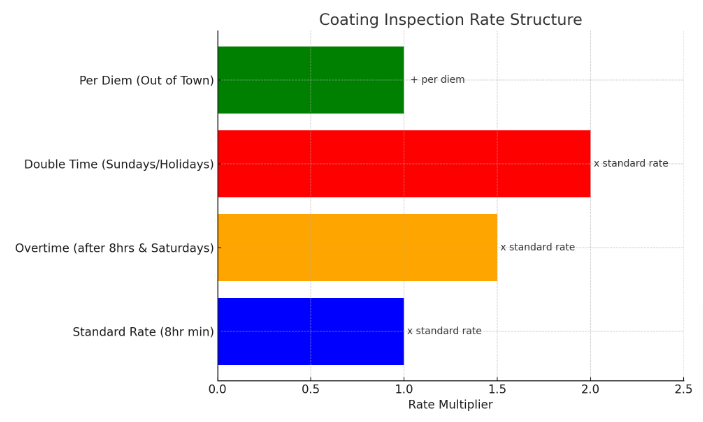
Investing in a professional inspection through Toronto Industrial is a decision that underscores the importance of quality, reliability, and long-term asset protection. It’s not merely an expenditure; rather, it’s a strategic investment that can significantly mitigate the risk of costly repairs or replacements in the future. By preempting potential issues through expert inspection, clients can enjoy peace of mind, knowing that their assets are maintained to the highest standards.
Customized Inspection Plans
Recognizing that each client has unique needs and budget constraints, Toronto Industrial offers customized inspection plans. These tailored solutions are devised in close collaboration with clients, ensuring that the inspection services provided align perfectly with their specific requirements and financial considerations. This client-centric approach highlights our commitment to delivering value and excellence in every project we undertake.
How Much Do Coating Inspections Cost?
A lot less than it costs to neglect them. This might seem like a simple assertion, but it captures the essence of the value proposition offered by comprehensive coating inspections. When considering the financial implications of coating inspections, it’s crucial to juxtapose the upfront costs against the potential expenses associated with premature coating failures, corrosion, or structural damage. These latter scenarios often lead to costly repairs, significant downtime, and, in severe cases, complete asset replacement.
While the exact cost of a coating inspection by Toronto Industrial or any reputable service provider will vary based on factors such as the project’s complexity, the scope of inspection required, and the level of expertise of the inspectors, investing in these services is fundamentally about securing the longevity and reliability of your assets. For example, a standard inspection for a mid-sized industrial facility could range from a few hundred to several thousand dollars, a figure that is significantly dwarfed by the potential costs of addressing extensive corrosion or coating system failures, which can easily run into the tens or even hundreds of thousands.
Moreover, the cost-effectiveness of coating inspections becomes even more apparent when considering the added value they provide in extending the lifespan of an asset, improving performance, and ensuring compliance with industry standards and regulations. By identifying and addressing potential issues early on, businesses can avoid the steep costs associated with major repairs or replacements and minimize operational disruptions.
Ultimately, the question isn’t so much about how much a coating inspection costs, but rather, how much you can save by proactively maintaining the integrity of your coatings. With the tailored and expert services offered by providers like Toronto Industrial Painting, the investment in coating inspection is a prudent step towards safeguarding your assets, optimizing operational efficiency, and ensuring the safety of your infrastructure.
Conclusion
Selecting a professional, AMPP level 3 certified surface inspection company is a critical decision that can significantly impact the longevity and performance of industrial assets. Toronto Industrial Painting, with its team of skilled AMPP-certified inspectors and comprehensive suite of inspection services, stands as a trusted partner in maintaining asset integrity. Prospective clients are encouraged to reach out for a consultation to discuss their inspection needs and receive a customized cost estimate. In entrusting your coating inspection needs to Toronto Industrial Painting, you ensure not just the protection of your assets but also the optimization of your investment in maintenance and asset management practices.
We’re thrilled to share a glimpse into one of our recent ventures at Toronto Industrial Coating Consultants, where our commitment to excellence and our expertise in the industrial coatings industry truly shines. 🌟
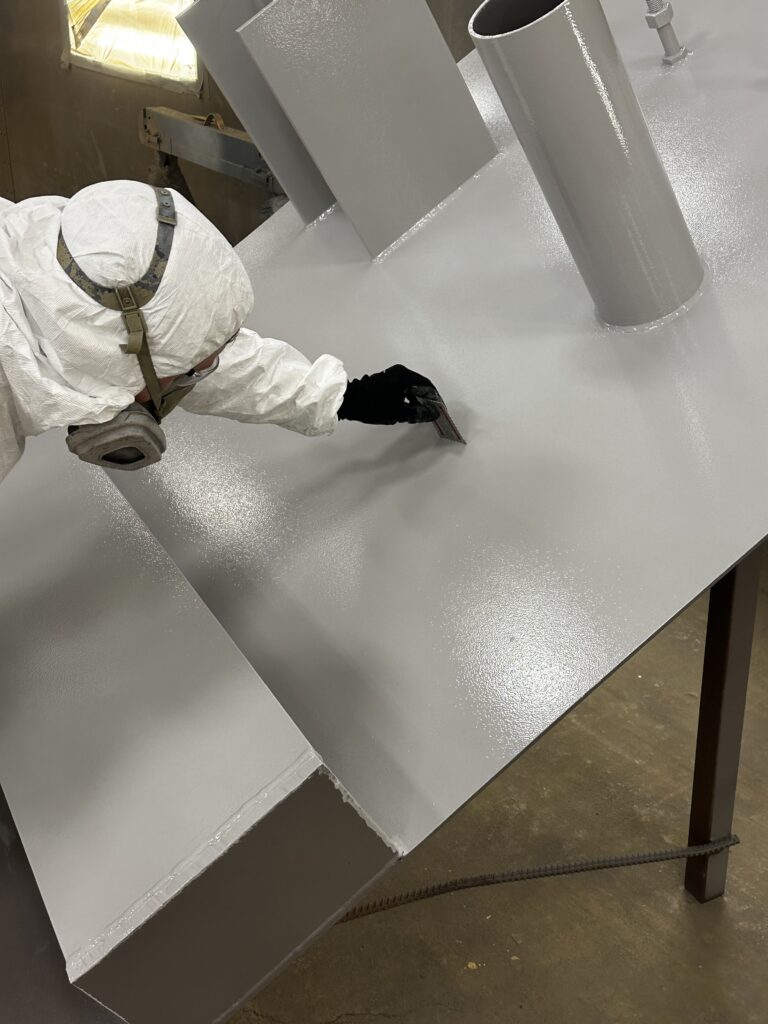
As a NACE-certified coating inspector with over 30 years of experience, we hold ourselves to the highest standards of service and quality. Our recent project took us on an exciting journey, dedicating several days to certifying painters for a US Army Corps of Engineers specified project. This task was not only a testament to our team’s skill and dedication but also a privilege, as it involved a critical role in ensuring the highest quality of workmanship for a project of national significance.
🎥 Check out our video to see our team in action during the coating inspection and certification process. It’s moments like these that remind us of the impact our work has, not just locally in Southern Ontario, but on a much larger scale.
This project underscores our commitment to delivering outstanding service and the importance of having a skilled, NACE-certified team ready to meet the challenges of any project, big or small. We’re proud to contribute our expertise to such a vital and prestigious project, ensuring safety, durability, and the highest standards of industrial coatings.
To our team, partners, and clients, thank you for your trust and support in making projects like these a success. We look forward to continuing to serve the industrial coatings needs of Southern Ontario and beyond with the same level of excellence and dedication.
Stay tuned for more updates and insights into our work. Your trust drives us to achieve greater heights.
Feel free to reach out for more information about our services or to discuss your next project.
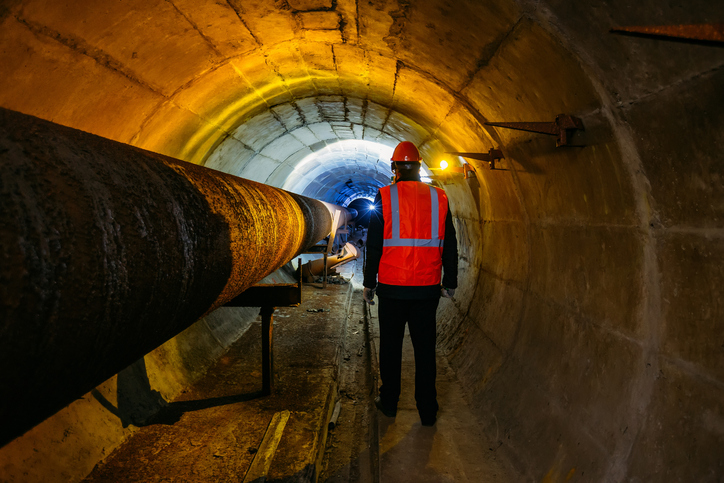
In the intricate world of industrial painting, the smallest oversight can have cascading effects on the quality and longevity of the final product. One of the often-overlooked yet crucial elements in this process is the illumination of the work area. Ensuring the right lighting not only aids in achieving top-notch workmanship but also ensures that inspections meet project specifications and requirements. The question arises, how can the delicate balance of proper illumination be maintained without compromising safety?
The Lighting Challenge
Illumination in the workplace presents a unique set of challenges. On the one hand, proper visibility is vital for ensuring work is up to standard. On the other, excessive or impractical lighting can pose safety risks. The task becomes further complicated when the nature of the job necessitates varied lighting conditions, as is the case with industrial painting.
The Role of Proper Illumination in Inspections
For an inspection to be accurate and efficient, the work area must be adequately lit. This ensures that the coating inspector can clearly see any discrepancies or deviations from the required standards. When the illumination is insufficient, not only does it jeopardize the quality of the inspection, but it also undermines the value of the project specifications and requirements.
However, illumination isn’t just about quantity; it’s also about quality. An overly bright light source can be obstructive, and in the delicate dance of industrial painting, this can cause more harm than good. NACE certified coating Inspectors and workers alike need a light source that aids their task without becoming a hindrance.
Guidance from the Industry: SSPC-Guide No 12
Thankfully, the coatings industry isn’t in the dark about this crucial aspect. The SSPC-Guide No 12, “Guide for Illumination of Industrial Painting Projects”, freshly re-released in 2023, is a beacon of guidance in this matter. While it serves as a guide specific to the coatings industry, its contents are invaluable to both specifiers and contractors.
This guide sheds light on the types of lighting necessary, factoring in various hazards and operational conditions. It gives explicit illumination levels required for specific tasks—ranging from surface preparation to coating application, and crucially, inspection. The guidelines emphasize not just on generic lighting but delve deep into recommendations for task lighting, inspection light, and supplemental lighting. It addresses challenges like explosion-safe lighting and offers insights into technical aspects like foot candles and lux.
Lighting, while seemingly straightforward, plays a pivotal role in ensuring that industrial painting projects meet the stringent standards set by project specifications and requirements. With resources like the SSPC-Guide No 12, contractors and inspectors can navigate the often murky waters of work area illumination with confidence.
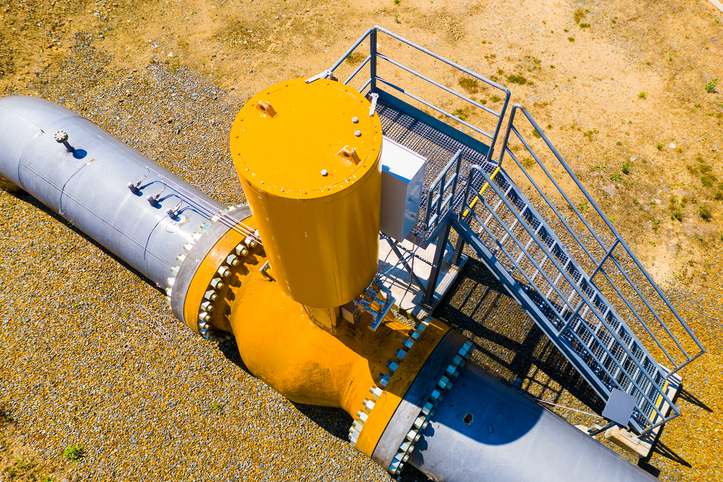
In 2021, the world was taken aback by a grave revelation – whistleblowers across North America came forward to raise alarms about potential safety concerns involving major pipelines. This incident, although not recent, serves as a timely cautionary tale of the paramount importance of coating inspection in safeguarding the integrity of our critical infrastructures.
A Look Back at the 2021 Incident
The whistleblowers unveiled potential pitfalls in the quality of materials and workmanship within some of the continent’s most significant pipeline projects. These lapses could have resulted in catastrophic environmental and economic repercussions. At the heart of their concerns was a recurring theme: the silent but relentless enemy known as corrosion.
Corrosion compromises the longevity and safety of essential infrastructures, ranging from vast pipelines to crucial water storage tanks and bridges. The pivotal role of a coating inspector is to ensure that these structures remain shielded against the destructive power of corrosion with robust, high-quality coatings.
Why NACE Certification Matters
So, what sets a NACE-certified inspector apart in this crucial responsibility? The National Association of Corrosion Engineers (NACE) is globally renowned for its rigorous certification programs that signify an inspector’s comprehensive knowledge and unwavering commitment to the highest industry standards.
Holding a NACE Level 3 certification, as the team at Toronto Industrial Painting does, indicates an elite level of expertise. It’s not just about understanding corrosion; it’s about mastering both the theoretical and hands-on elements of corrosion control, coating inspection, and proficient project management.
Toronto Industrial Painting: Leading the Way in Surface Inspection
With its rich legacy, Toronto Industrial Painting has established itself as Ontario’s pinnacle in surface inspection. The services we offer encompass:
- Consulting: Our seasoned experts guide you, ensuring the optimal coating solution tailored to your project’s unique demands.
- Quality Assurance & Control: With eagle-eyed precision, we oversee every facet of your project, confirming that all procedures align with the zenith of industry standards.
- Failure Analysis: Should any aspect falter, our adept team delves deep, pinpointing the root cause and charting a course to avert future reoccurrences.
Our specialization in high-performance epoxies and urethane for structures, such as bridges and water tanks, ensures every project we undertake is meticulously managed for long-lasting safety and performance.
A Reminder of Our Responsibility
The 2021 whistleblower incident, though a couple of years behind us, is a potent reminder of the critical role of coating inspectors in maintaining the safety and durability of our infrastructure. In an era where structural integrity is non-negotiable, the onus is on us to prioritize excellence in inspection and coating application.
For a project that stands the test of time and elements, choose the unparalleled expertise of Toronto Industrial Painting. We’re not just NACE-certified; we’re your partners in ensuring excellence. Reach out to our dedicated team today and witness the difference meticulous inspection can make..
The realm of industrial coating is vast and continually evolving, with new standards and technologies being introduced frequently. Amidst this dynamic landscape, it’s imperative for professionals to stay updated and certified to guarantee the utmost quality in their projects. Toronto Industrial, a leading name in Ontario’s coating inspection industry, recognizes the significance of these certifications. Let’s delve into a comprehensive overview of the types of inspector certifications available and the importance of staying abreast with industry changes.
Distinguishing Between Different Certifications
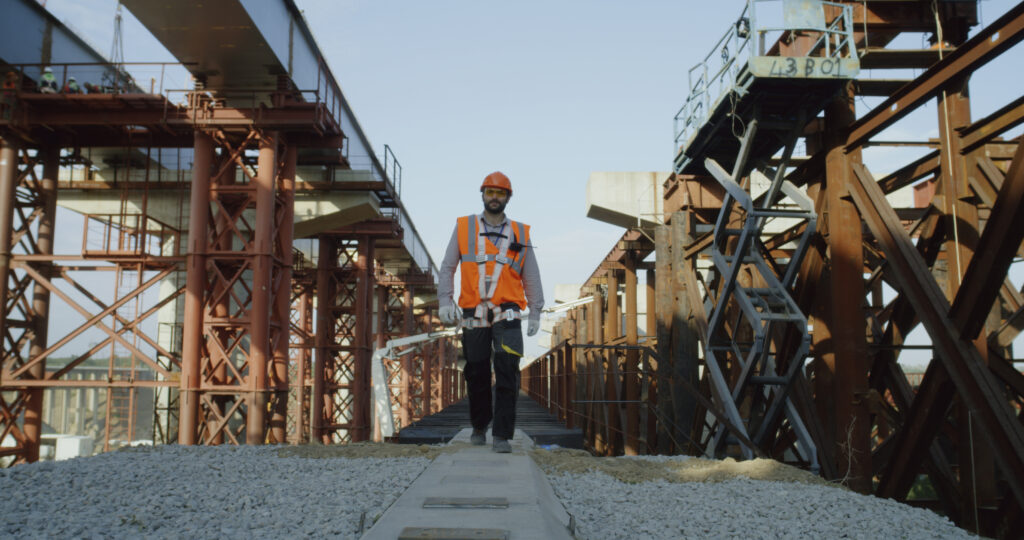
SSPC Certifications
The Society for Protective Coatings (SSPC) has crafted several certifications catering to various industry needs:
- Concrete Coatings Inspector (CCI): Targeted towards professionals inspecting flooring or coatings on concrete. It emphasizes ensuring proper concrete preparation and accurate coating system installation.
- Bridge Coatings Inspection (BCI): Tailored for those inspecting coating applications on bridges and highways. This certification delves into the different elements of a bridge, making inspectors adept at recording intricate details during their assessments.
- Protective Coating Inspector Program: A holistic program that covers all industries where protective coatings are installed on steel. Although the primary focus is on steel as a substrate, the training is comprehensive, catering to various sectors.
NACE Certifications
The National Association of Corrosion Engineers (NACE) offers a program that is more general, spanning two weeks and dealing with various aspects of coating and lining installation. While there’s a resemblance between SSPC’s Protective Coating Inspector program and NACE’s offering, notable differences lie in the duration and depth of the programs.
Protective Coding Specialist (PCs) Certification
Both SSPC and NACE offer PCs certification, but it’s designed more for coding specifiers rather than inspectors. This certification is more about designing a coding project than inspecting one. Those certified under PCs are adept at tasks like lifecycle cost of coatings, assessing the condition of coatings, and preparing specifications.
Reciprocity and Keeping Up With Certifications
Interestingly, there’s no reciprocity between SSPC and NACE certifications. Therefore, one cannot substitute the credentials of one organization for the other. Also, like most professional certifications, maintaining them is crucial. Both SSPC and NACE certifications necessitate recertification every few years, emphasizing the importance of staying updated in the industry.
The Vitality of Staying Updated
With industry standards poised for revisions every five years and the plethora of standards from various bodies like ASTM, staying updated can indeed be a daunting task. However, it’s pivotal to be well-versed with the current standards, especially as they might feature prominently in specifications. Whether you’re inspecting based on those specifications or writing them, being unaware of the latest standards can lead to significant lapses in quality and compliance.
A Unified Future with AMPP
It’s noteworthy that NACE International and SSPC have now merged to form the Association for Materials Protection and Performance (AMPP). This unification aims to provide a consolidated voice for the corrosion control and protective coatings sectors. This new association, with its two governance structures, will undoubtedly bring forth more streamlined certifications and standards in the future.
Conclusion
While certifications are essential indicators of a professional’s expertise, the real essence lies in the continual learning and application of that knowledge. Toronto Industrial, with its commitment to quality and adherence to the highest standards, underscores the importance of having certified professionals on board and staying updated with industry advancements. As the coating industry keeps evolving, so does our commitment to excellence and upholding the highest standards.
Toronto Industrial stands as a beacon of excellence in Ontario for NACE Certified Coating Inspection services across Levels 1, 2, and 3. Our mission is not just about completing projects; it’s about preventing environmental and structural disasters that could compromise the integrity of your assets. Through rigorous inspections, best-practice recommendations, and quality assurance, we provide enduring solutions that keep your facilities safe and extend their lifespan.
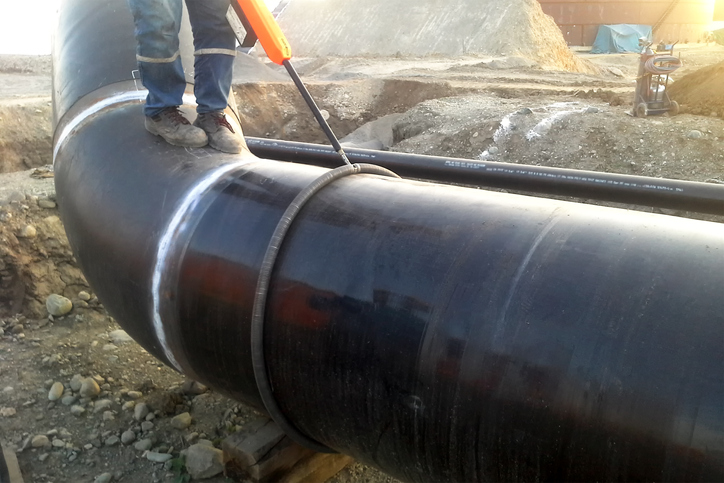
Our Role and Qualifications
NACE Certified (Level 1/2/3) Coating Inspectors
Toronto Industrial is proud to offer a team of coating inspectors who are certified across NACE Levels 1, 2, and 3. These professionals spearhead our Inspection, Measurement, and Monitoring (IMM) initiatives, ensuring every project adheres to its specified drawings, conditions, and quality management plans.
Key Responsibilities
Thorough Review of Project Elements
Our team goes beyond merely reviewing construction drawings and specifications. We scrutinize every detail to guarantee alignment with the overarching project goals, while also considering environmental impacts and long-term effects.
Tailored Safety Programs
Safety is a core focus for us, and our approach extends past the usual Toolbox Talks and job safety analyses. We develop custom safety training modules tailored to the unique risks associated with each project.
Daily Accountability Through Reporting
We are committed to full transparency, providing daily reports that shed light on the day’s activities, progress, and issues. This practice empowers all stakeholders to make timely, informed decisions.
Comprehensive Quality Assurance
Quality assurance at Toronto Industrial is far more than a checklist; it’s a pledge to ensure the durability and longevity of your assets. This entails meticulous verification processes, from substrate cleanliness and coating batch numbers to application techniques and much more. Learn more from https://youtu.be/gxANBtRJE5g?si=u2bWeRxz_b2LADDl
Environmental Stewardship
Alongside project safety, we prioritize broader environmental concerns. This is vital for infrastructure projects like bridges and water tanks, which could have significant environmental impacts if not managed appropriately.
Experience and Skills
Versatile Expertise
Our team is well-versed in a wide variety of industrial and pipeline construction projects, possessing the skills needed to navigate the unique challenges of each.
Technological Savvy
We employ state-of-the-art software, including the MS Office Suite and other web-based applications, to ensure efficient project management and clear communications.
Swift Adaptability
Our team’s ability to adapt and find rapid solutions is invaluable in the fast-paced, deadline-driven work environments we often find ourselves in.
Education and Professional Certification
Every inspector at Toronto Industrial is NACE Certified, meeting and often exceeding industry standards. This guarantees a high level of competence and reliability.
From small facilities to expansive industrial complexes, Toronto Industrial offers unparalleled expertise in the specialized field of coating inspection and corrosion prevention. For those considering a project that traditionally requires other types of certifications, it’s worth noting that our NACE Level 3 qualifications could provide a superior level of expertise. Contact us today for a free consultation and see how our services can best meet your needs.
Toronto Industrial, as Ontario’s leading surface inspection company, specializes in all aspects of coating inspection services. From consulting and quality assurance to quality control and failure analysis, our NACE-certified level 3 inspectors are well-equipped to handle projects involving corrosion protection for infrastructures such as bridges, water tanks, and other industrial assets. However, in some instances, the role of an MPI (Master Painters Institute) Certified Architectural Coatings Inspector becomes critical. While NACE certification is generally considered a higher qualification, MPI certification is sometimes specifically required, depending on project needs and architectural stipulations. In such cases, a thorough understanding of what an MPI Certified Architectural Coatings Inspector is and what they do is crucial.
What is an MPI Certified Architectural Coatings Inspector?
An MPI Certified Architectural Coatings Inspector is a professional trained and certified by the Master Painters Institute to inspect, evaluate, and ensure the quality of paint and coatings used in architectural projects. This certification focuses particularly on coatings designed for buildings and other structures, taking into account both aesthetic and protective elements.
Responsibilities and Duties
Pre-Project Consulting
Before a project begins, an MPI Certified Architectural Coatings Inspector helps in consulting and planning to choose the appropriate materials and coatings. They evaluate the environmental conditions, substrate type, and other factors to recommend the most suitable coatings for optimum performance.
Quality Assurance
During the application phase, these inspectors are responsible for ensuring that the coatings meet the specifications set forth in the project documentation. They check the surface preparation, application methods, and curing conditions, verifying that all steps align with MPI standards for architectural coatings.
Quality Control
Ongoing checks during the application process are part of the inspector’s role. These involve visual inspections, adhesion tests, and dry film thickness measurements. Any deviations from the plan are immediately reported, and corrective measures are initiated.
Failure Analysis
In the event of coating failure, an MPI Certified Architectural Coatings Inspector will conduct a comprehensive analysis to determine the cause. They will make recommendations for remediation and future prevention.
The Synergy with NACE Certification
NACE (National Association of Corrosion Engineers) certification is more extensive in scope, covering various types of coatings including high-performance epoxies and urethanes designed to protect against corrosion in harsh industrial settings. However, an MPI Certified Architectural Coatings Inspector brings specialized expertise in architectural coatings, which could be necessary for projects involving aesthetic considerations alongside protective requirements.
Related: How do NACE and SSPC differ from each other?
When Does a NACE Level 3 Inspector Step In?
While NACE Level 3 certification is generally considered higher, there are instances where the specific expertise of an MPI Certified Architectural Coatings Inspector is required. If such an inspector is not available, a NACE Level 3 inspector can fill in but would usually need to have their qualifications approved by the project architect. Toronto Industrial, with its NACE-certified inspectors, has the experience and credentials to handle these roles effectively, given prior approval.
Whether you require a NACE level 3 inspector or an MPI Certified Architectural Coatings Inspector, the key is to have a qualified professional who can ensure the longevity and effectiveness of your coatings. These inspections are not just about meeting project specifications; they are about protecting your investment and ensuring the safety and aesthetic value of the structures for years to come.
For more information or a free consultation on your specific coating inspection needs, contact Toronto Industrial today at 416.444.5092.

